BUSN07025 Essay: Analyzing COVID-19's Global Economic Impact
VerifiedAdded on 2023/06/18
|9
|2099
|346
Essay
AI Summary
This essay examines the significant global economic impacts of the COVID-19 pandemic, focusing on the effects on global financial markets and GDP. It highlights the substantial declines and long-term scars resulting from decreased spending, wealth degradation, and disrupted supply chains. The analysis includes quantitative data and expert opinions, projecting a 5.2 percent loss in global GDP for 2020. Furthermore, the essay provides a personal reflection on the author's economic learning journey, emphasizing the relevance of economic principles to broader societal and business contexts. The reflection underscores the importance of understanding economic drivers for informed decision-making and policy development, referencing examples such as China's success in poverty reduction through economic reforms. The essay concludes by noting the critical skills gained through economic analysis, such as problem-solving, analytical thinking, and cultural awareness, which are valuable in various professional fields. Desklib provides this essay as a resource for students, alongside a wealth of other solved assignments and past papers.
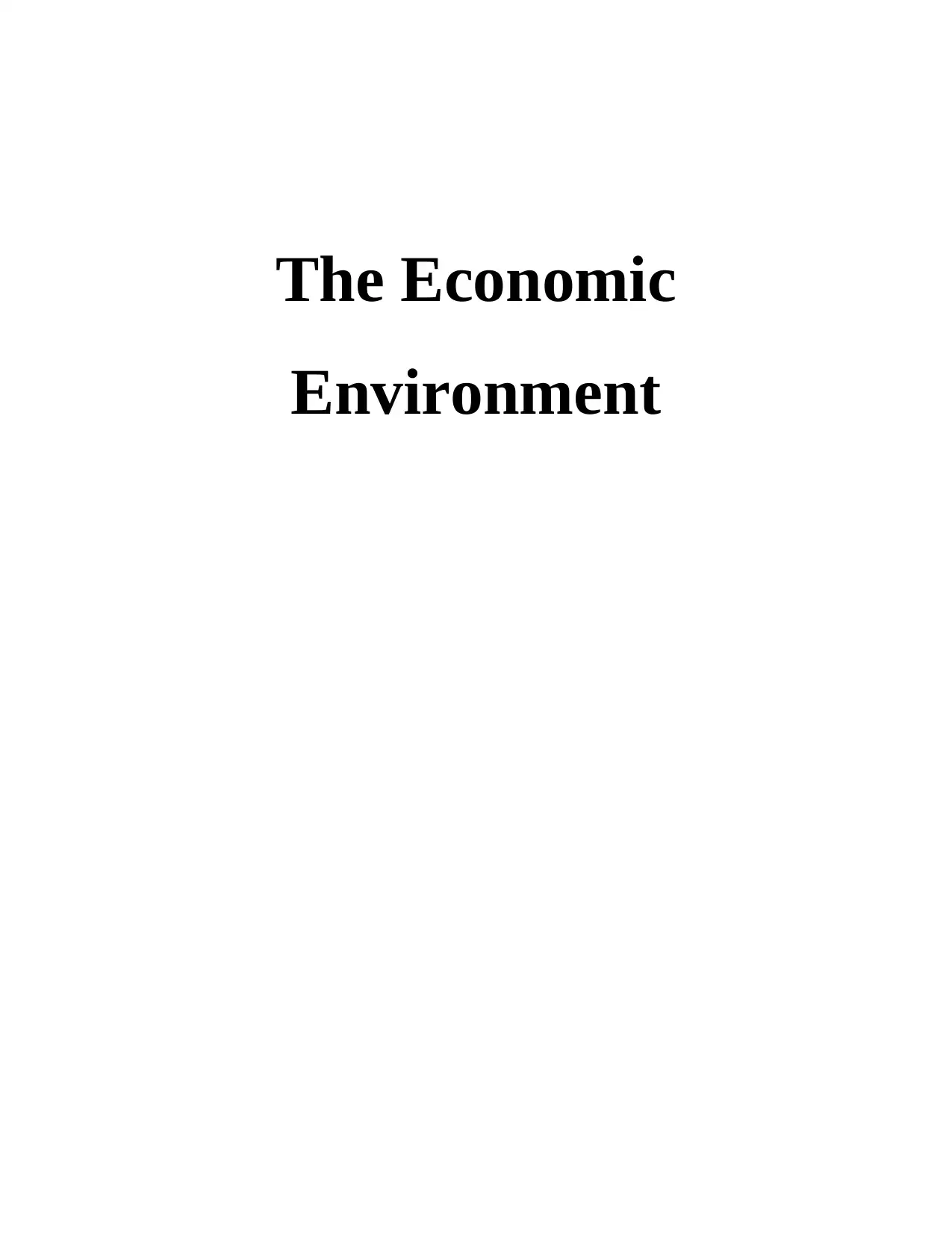
The Economic
Environment
Environment
Paraphrase This Document
Need a fresh take? Get an instant paraphrase of this document with our AI Paraphraser
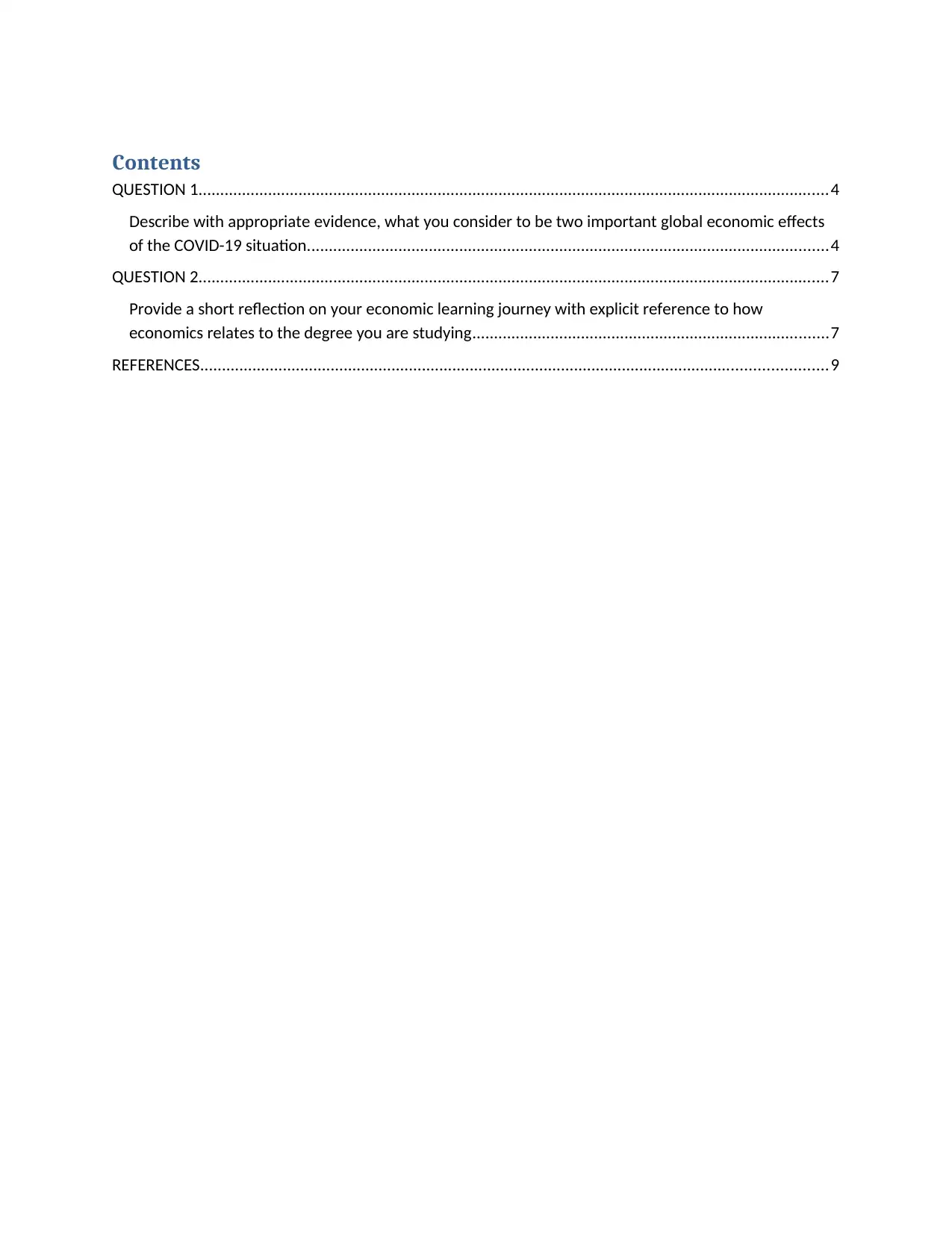
Contents
QUESTION 1.................................................................................................................................................4
Describe with appropriate evidence, what you consider to be two important global economic effects
of the COVID-19 situation........................................................................................................................4
QUESTION 2.................................................................................................................................................7
Provide a short reflection on your economic learning journey with explicit reference to how
economics relates to the degree you are studying..................................................................................7
REFERENCES................................................................................................................................................9
QUESTION 1.................................................................................................................................................4
Describe with appropriate evidence, what you consider to be two important global economic effects
of the COVID-19 situation........................................................................................................................4
QUESTION 2.................................................................................................................................................7
Provide a short reflection on your economic learning journey with explicit reference to how
economics relates to the degree you are studying..................................................................................7
REFERENCES................................................................................................................................................9
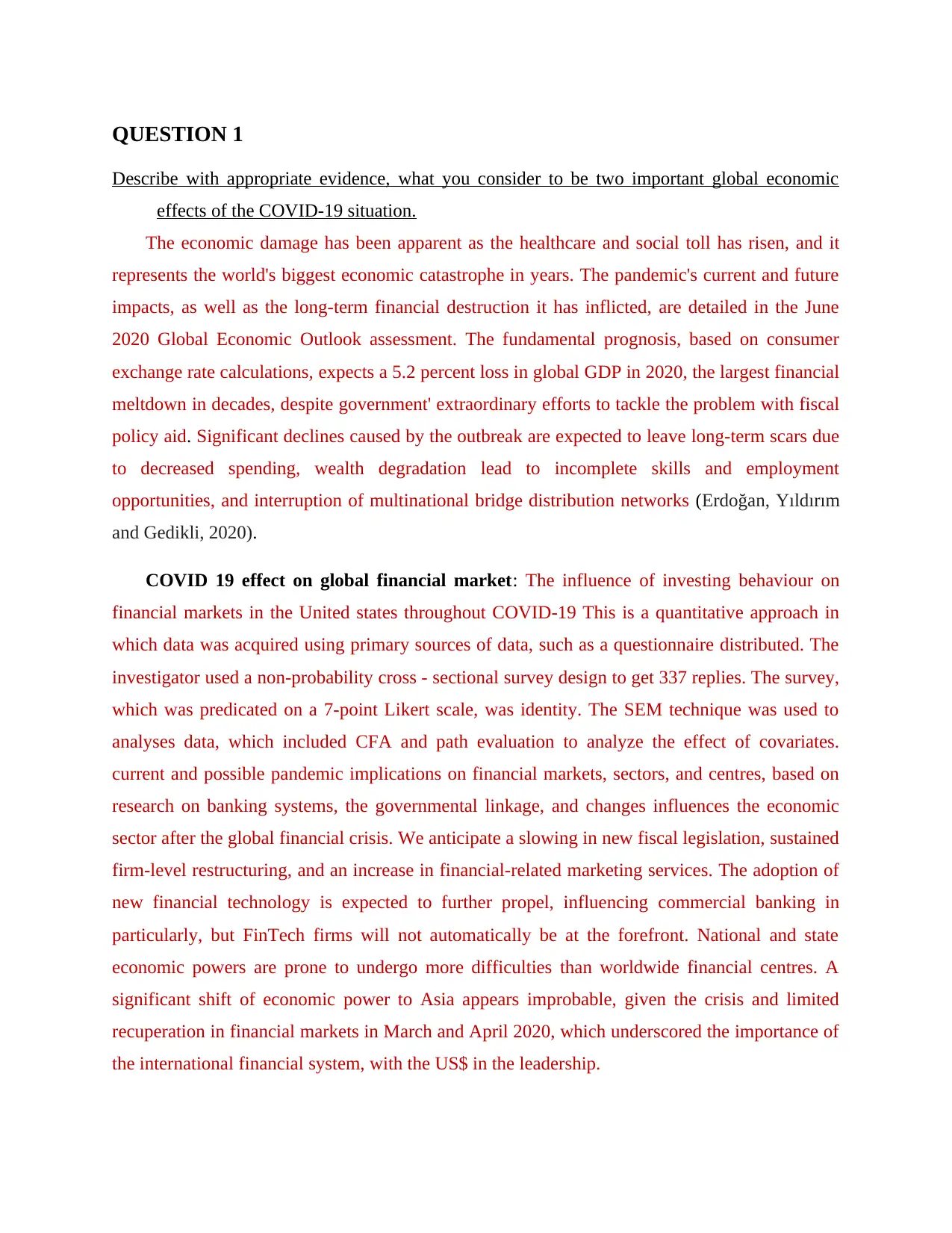
QUESTION 1
Describe with appropriate evidence, what you consider to be two important global economic
effects of the COVID-19 situation.
The economic damage has been apparent as the healthcare and social toll has risen, and it
represents the world's biggest economic catastrophe in years. The pandemic's current and future
impacts, as well as the long-term financial destruction it has inflicted, are detailed in the June
2020 Global Economic Outlook assessment. The fundamental prognosis, based on consumer
exchange rate calculations, expects a 5.2 percent loss in global GDP in 2020, the largest financial
meltdown in decades, despite government' extraordinary efforts to tackle the problem with fiscal
policy aid. Significant declines caused by the outbreak are expected to leave long-term scars due
to decreased spending, wealth degradation lead to incomplete skills and employment
opportunities, and interruption of multinational bridge distribution networks (Erdoğan, Yıldırım
and Gedikli, 2020).
COVID 19 effect on global financial market: The influence of investing behaviour on
financial markets in the United states throughout COVID-19 This is a quantitative approach in
which data was acquired using primary sources of data, such as a questionnaire distributed. The
investigator used a non-probability cross - sectional survey design to get 337 replies. The survey,
which was predicated on a 7-point Likert scale, was identity. The SEM technique was used to
analyses data, which included CFA and path evaluation to analyze the effect of covariates.
current and possible pandemic implications on financial markets, sectors, and centres, based on
research on banking systems, the governmental linkage, and changes influences the economic
sector after the global financial crisis. We anticipate a slowing in new fiscal legislation, sustained
firm-level restructuring, and an increase in financial-related marketing services. The adoption of
new financial technology is expected to further propel, influencing commercial banking in
particularly, but FinTech firms will not automatically be at the forefront. National and state
economic powers are prone to undergo more difficulties than worldwide financial centres. A
significant shift of economic power to Asia appears improbable, given the crisis and limited
recuperation in financial markets in March and April 2020, which underscored the importance of
the international financial system, with the US$ in the leadership.
Describe with appropriate evidence, what you consider to be two important global economic
effects of the COVID-19 situation.
The economic damage has been apparent as the healthcare and social toll has risen, and it
represents the world's biggest economic catastrophe in years. The pandemic's current and future
impacts, as well as the long-term financial destruction it has inflicted, are detailed in the June
2020 Global Economic Outlook assessment. The fundamental prognosis, based on consumer
exchange rate calculations, expects a 5.2 percent loss in global GDP in 2020, the largest financial
meltdown in decades, despite government' extraordinary efforts to tackle the problem with fiscal
policy aid. Significant declines caused by the outbreak are expected to leave long-term scars due
to decreased spending, wealth degradation lead to incomplete skills and employment
opportunities, and interruption of multinational bridge distribution networks (Erdoğan, Yıldırım
and Gedikli, 2020).
COVID 19 effect on global financial market: The influence of investing behaviour on
financial markets in the United states throughout COVID-19 This is a quantitative approach in
which data was acquired using primary sources of data, such as a questionnaire distributed. The
investigator used a non-probability cross - sectional survey design to get 337 replies. The survey,
which was predicated on a 7-point Likert scale, was identity. The SEM technique was used to
analyses data, which included CFA and path evaluation to analyze the effect of covariates.
current and possible pandemic implications on financial markets, sectors, and centres, based on
research on banking systems, the governmental linkage, and changes influences the economic
sector after the global financial crisis. We anticipate a slowing in new fiscal legislation, sustained
firm-level restructuring, and an increase in financial-related marketing services. The adoption of
new financial technology is expected to further propel, influencing commercial banking in
particularly, but FinTech firms will not automatically be at the forefront. National and state
economic powers are prone to undergo more difficulties than worldwide financial centres. A
significant shift of economic power to Asia appears improbable, given the crisis and limited
recuperation in financial markets in March and April 2020, which underscored the importance of
the international financial system, with the US$ in the leadership.
⊘ This is a preview!⊘
Do you want full access?
Subscribe today to unlock all pages.

Trusted by 1+ million students worldwide
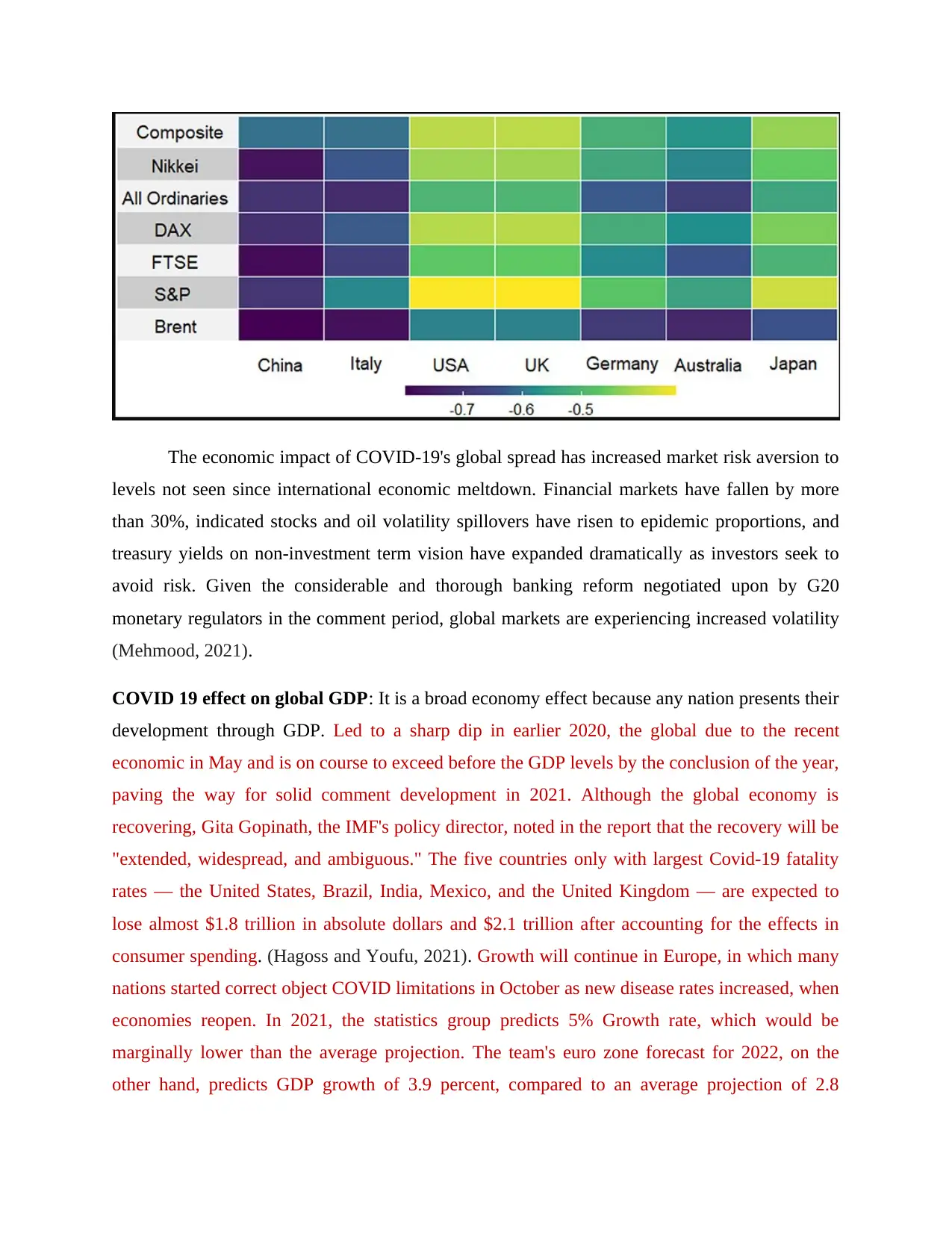
The economic impact of COVID-19's global spread has increased market risk aversion to
levels not seen since international economic meltdown. Financial markets have fallen by more
than 30%, indicated stocks and oil volatility spillovers have risen to epidemic proportions, and
treasury yields on non-investment term vision have expanded dramatically as investors seek to
avoid risk. Given the considerable and thorough banking reform negotiated upon by G20
monetary regulators in the comment period, global markets are experiencing increased volatility
(Mehmood, 2021).
COVID 19 effect on global GDP: It is a broad economy effect because any nation presents their
development through GDP. Led to a sharp dip in earlier 2020, the global due to the recent
economic in May and is on course to exceed before the GDP levels by the conclusion of the year,
paving the way for solid comment development in 2021. Although the global economy is
recovering, Gita Gopinath, the IMF's policy director, noted in the report that the recovery will be
"extended, widespread, and ambiguous." The five countries only with largest Covid-19 fatality
rates — the United States, Brazil, India, Mexico, and the United Kingdom — are expected to
lose almost $1.8 trillion in absolute dollars and $2.1 trillion after accounting for the effects in
consumer spending. (Hagoss and Youfu, 2021). Growth will continue in Europe, in which many
nations started correct object COVID limitations in October as new disease rates increased, when
economies reopen. In 2021, the statistics group predicts 5% Growth rate, which would be
marginally lower than the average projection. The team's euro zone forecast for 2022, on the
other hand, predicts GDP growth of 3.9 percent, compared to an average projection of 2.8
levels not seen since international economic meltdown. Financial markets have fallen by more
than 30%, indicated stocks and oil volatility spillovers have risen to epidemic proportions, and
treasury yields on non-investment term vision have expanded dramatically as investors seek to
avoid risk. Given the considerable and thorough banking reform negotiated upon by G20
monetary regulators in the comment period, global markets are experiencing increased volatility
(Mehmood, 2021).
COVID 19 effect on global GDP: It is a broad economy effect because any nation presents their
development through GDP. Led to a sharp dip in earlier 2020, the global due to the recent
economic in May and is on course to exceed before the GDP levels by the conclusion of the year,
paving the way for solid comment development in 2021. Although the global economy is
recovering, Gita Gopinath, the IMF's policy director, noted in the report that the recovery will be
"extended, widespread, and ambiguous." The five countries only with largest Covid-19 fatality
rates — the United States, Brazil, India, Mexico, and the United Kingdom — are expected to
lose almost $1.8 trillion in absolute dollars and $2.1 trillion after accounting for the effects in
consumer spending. (Hagoss and Youfu, 2021). Growth will continue in Europe, in which many
nations started correct object COVID limitations in October as new disease rates increased, when
economies reopen. In 2021, the statistics group predicts 5% Growth rate, which would be
marginally lower than the average projection. The team's euro zone forecast for 2022, on the
other hand, predicts GDP growth of 3.9 percent, compared to an average projection of 2.8
Paraphrase This Document
Need a fresh take? Get an instant paraphrase of this document with our AI Paraphraser
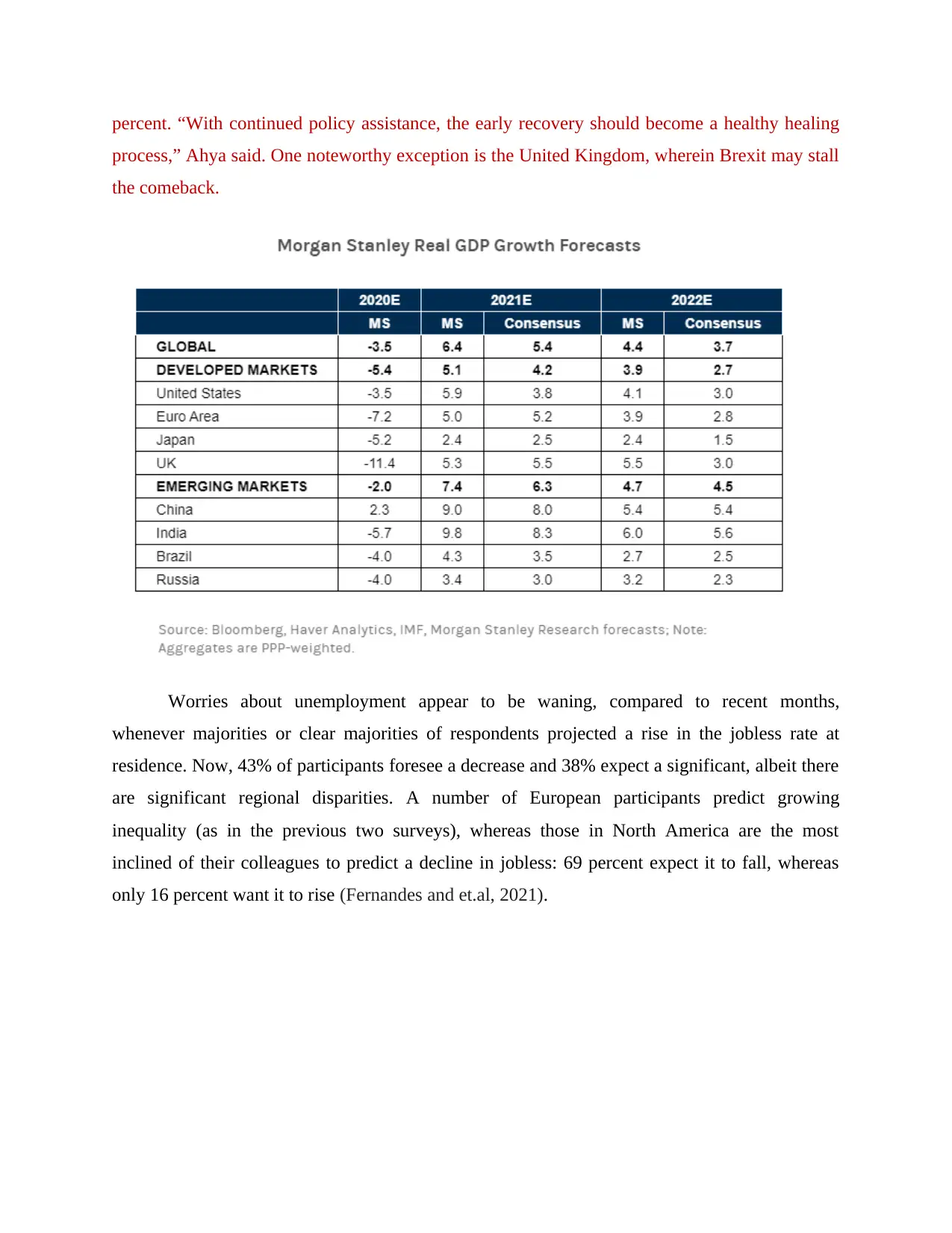
percent. “With continued policy assistance, the early recovery should become a healthy healing
process,” Ahya said. One noteworthy exception is the United Kingdom, wherein Brexit may stall
the comeback.
Worries about unemployment appear to be waning, compared to recent months,
whenever majorities or clear majorities of respondents projected a rise in the jobless rate at
residence. Now, 43% of participants foresee a decrease and 38% expect a significant, albeit there
are significant regional disparities. A number of European participants predict growing
inequality (as in the previous two surveys), whereas those in North America are the most
inclined of their colleagues to predict a decline in jobless: 69 percent expect it to fall, whereas
only 16 percent want it to rise (Fernandes and et.al, 2021).
process,” Ahya said. One noteworthy exception is the United Kingdom, wherein Brexit may stall
the comeback.
Worries about unemployment appear to be waning, compared to recent months,
whenever majorities or clear majorities of respondents projected a rise in the jobless rate at
residence. Now, 43% of participants foresee a decrease and 38% expect a significant, albeit there
are significant regional disparities. A number of European participants predict growing
inequality (as in the previous two surveys), whereas those in North America are the most
inclined of their colleagues to predict a decline in jobless: 69 percent expect it to fall, whereas
only 16 percent want it to rise (Fernandes and et.al, 2021).
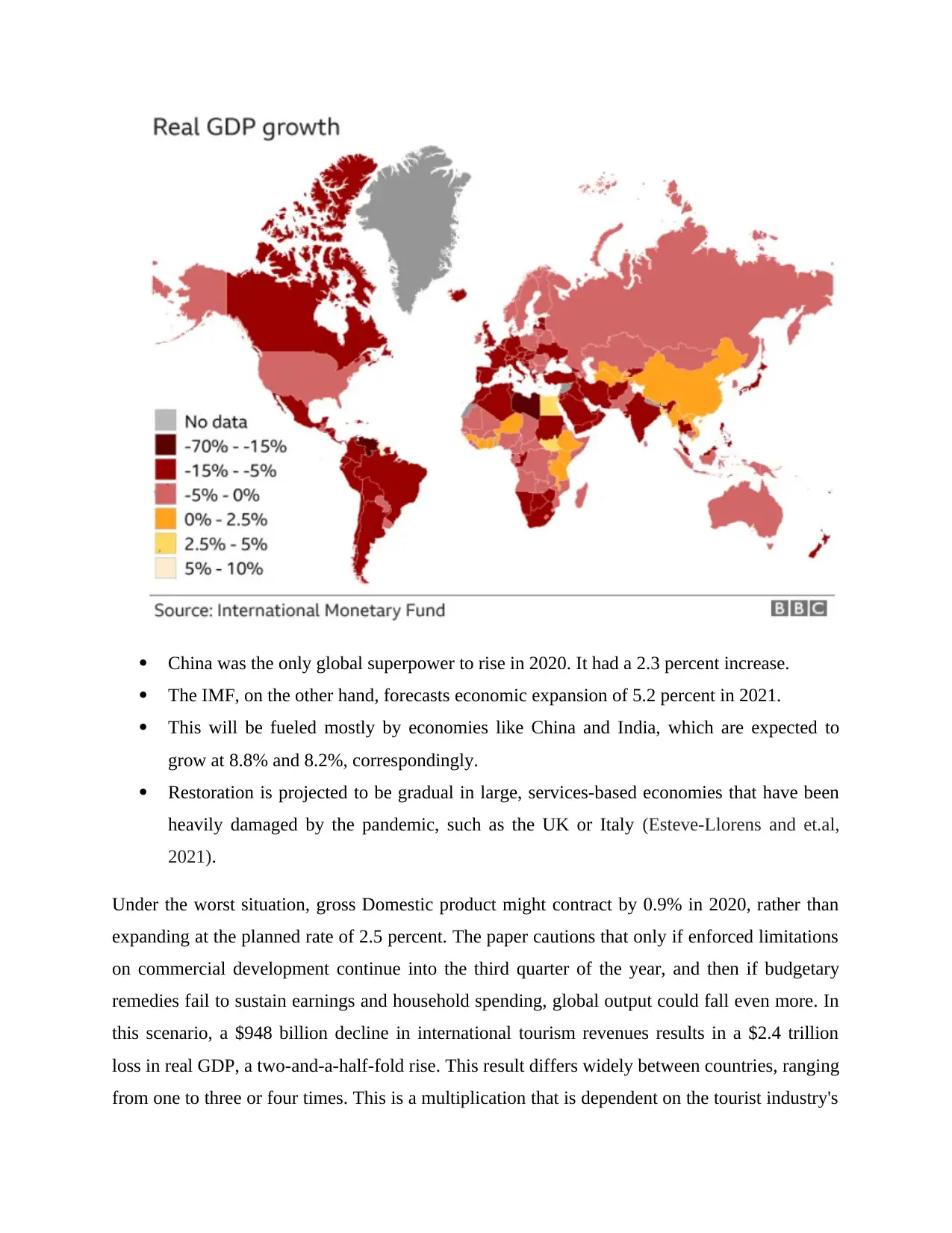
China was the only global superpower to rise in 2020. It had a 2.3 percent increase.
The IMF, on the other hand, forecasts economic expansion of 5.2 percent in 2021.
This will be fueled mostly by economies like China and India, which are expected to
grow at 8.8% and 8.2%, correspondingly.
Restoration is projected to be gradual in large, services-based economies that have been
heavily damaged by the pandemic, such as the UK or Italy (Esteve-Llorens and et.al,
2021).
Under the worst situation, gross Domestic product might contract by 0.9% in 2020, rather than
expanding at the planned rate of 2.5 percent. The paper cautions that only if enforced limitations
on commercial development continue into the third quarter of the year, and then if budgetary
remedies fail to sustain earnings and household spending, global output could fall even more. In
this scenario, a $948 billion decline in international tourism revenues results in a $2.4 trillion
loss in real GDP, a two-and-a-half-fold rise. This result differs widely between countries, ranging
from one to three or four times. This is a multiplication that is dependent on the tourist industry's
The IMF, on the other hand, forecasts economic expansion of 5.2 percent in 2021.
This will be fueled mostly by economies like China and India, which are expected to
grow at 8.8% and 8.2%, correspondingly.
Restoration is projected to be gradual in large, services-based economies that have been
heavily damaged by the pandemic, such as the UK or Italy (Esteve-Llorens and et.al,
2021).
Under the worst situation, gross Domestic product might contract by 0.9% in 2020, rather than
expanding at the planned rate of 2.5 percent. The paper cautions that only if enforced limitations
on commercial development continue into the third quarter of the year, and then if budgetary
remedies fail to sustain earnings and household spending, global output could fall even more. In
this scenario, a $948 billion decline in international tourism revenues results in a $2.4 trillion
loss in real GDP, a two-and-a-half-fold rise. This result differs widely between countries, ranging
from one to three or four times. This is a multiplication that is dependent on the tourist industry's
⊘ This is a preview!⊘
Do you want full access?
Subscribe today to unlock all pages.

Trusted by 1+ million students worldwide
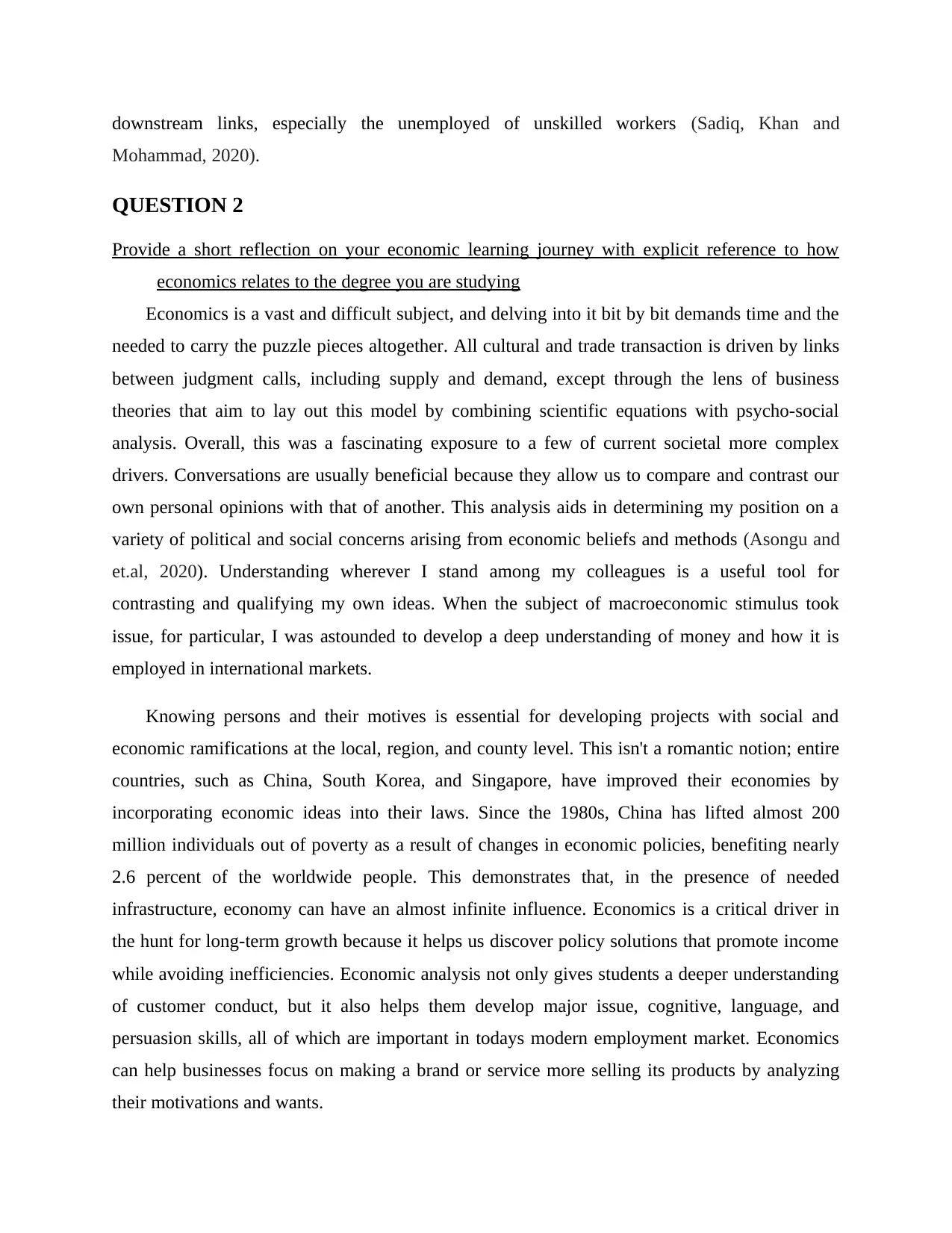
downstream links, especially the unemployed of unskilled workers (Sadiq, Khan and
Mohammad, 2020).
QUESTION 2
Provide a short reflection on your economic learning journey with explicit reference to how
economics relates to the degree you are studying
Economics is a vast and difficult subject, and delving into it bit by bit demands time and the
needed to carry the puzzle pieces altogether. All cultural and trade transaction is driven by links
between judgment calls, including supply and demand, except through the lens of business
theories that aim to lay out this model by combining scientific equations with psycho-social
analysis. Overall, this was a fascinating exposure to a few of current societal more complex
drivers. Conversations are usually beneficial because they allow us to compare and contrast our
own personal opinions with that of another. This analysis aids in determining my position on a
variety of political and social concerns arising from economic beliefs and methods (Asongu and
et.al, 2020). Understanding wherever I stand among my colleagues is a useful tool for
contrasting and qualifying my own ideas. When the subject of macroeconomic stimulus took
issue, for particular, I was astounded to develop a deep understanding of money and how it is
employed in international markets.
Knowing persons and their motives is essential for developing projects with social and
economic ramifications at the local, region, and county level. This isn't a romantic notion; entire
countries, such as China, South Korea, and Singapore, have improved their economies by
incorporating economic ideas into their laws. Since the 1980s, China has lifted almost 200
million individuals out of poverty as a result of changes in economic policies, benefiting nearly
2.6 percent of the worldwide people. This demonstrates that, in the presence of needed
infrastructure, economy can have an almost infinite influence. Economics is a critical driver in
the hunt for long-term growth because it helps us discover policy solutions that promote income
while avoiding inefficiencies. Economic analysis not only gives students a deeper understanding
of customer conduct, but it also helps them develop major issue, cognitive, language, and
persuasion skills, all of which are important in todays modern employment market. Economics
can help businesses focus on making a brand or service more selling its products by analyzing
their motivations and wants.
Mohammad, 2020).
QUESTION 2
Provide a short reflection on your economic learning journey with explicit reference to how
economics relates to the degree you are studying
Economics is a vast and difficult subject, and delving into it bit by bit demands time and the
needed to carry the puzzle pieces altogether. All cultural and trade transaction is driven by links
between judgment calls, including supply and demand, except through the lens of business
theories that aim to lay out this model by combining scientific equations with psycho-social
analysis. Overall, this was a fascinating exposure to a few of current societal more complex
drivers. Conversations are usually beneficial because they allow us to compare and contrast our
own personal opinions with that of another. This analysis aids in determining my position on a
variety of political and social concerns arising from economic beliefs and methods (Asongu and
et.al, 2020). Understanding wherever I stand among my colleagues is a useful tool for
contrasting and qualifying my own ideas. When the subject of macroeconomic stimulus took
issue, for particular, I was astounded to develop a deep understanding of money and how it is
employed in international markets.
Knowing persons and their motives is essential for developing projects with social and
economic ramifications at the local, region, and county level. This isn't a romantic notion; entire
countries, such as China, South Korea, and Singapore, have improved their economies by
incorporating economic ideas into their laws. Since the 1980s, China has lifted almost 200
million individuals out of poverty as a result of changes in economic policies, benefiting nearly
2.6 percent of the worldwide people. This demonstrates that, in the presence of needed
infrastructure, economy can have an almost infinite influence. Economics is a critical driver in
the hunt for long-term growth because it helps us discover policy solutions that promote income
while avoiding inefficiencies. Economic analysis not only gives students a deeper understanding
of customer conduct, but it also helps them develop major issue, cognitive, language, and
persuasion skills, all of which are important in todays modern employment market. Economics
can help businesses focus on making a brand or service more selling its products by analyzing
their motivations and wants.
Paraphrase This Document
Need a fresh take? Get an instant paraphrase of this document with our AI Paraphraser
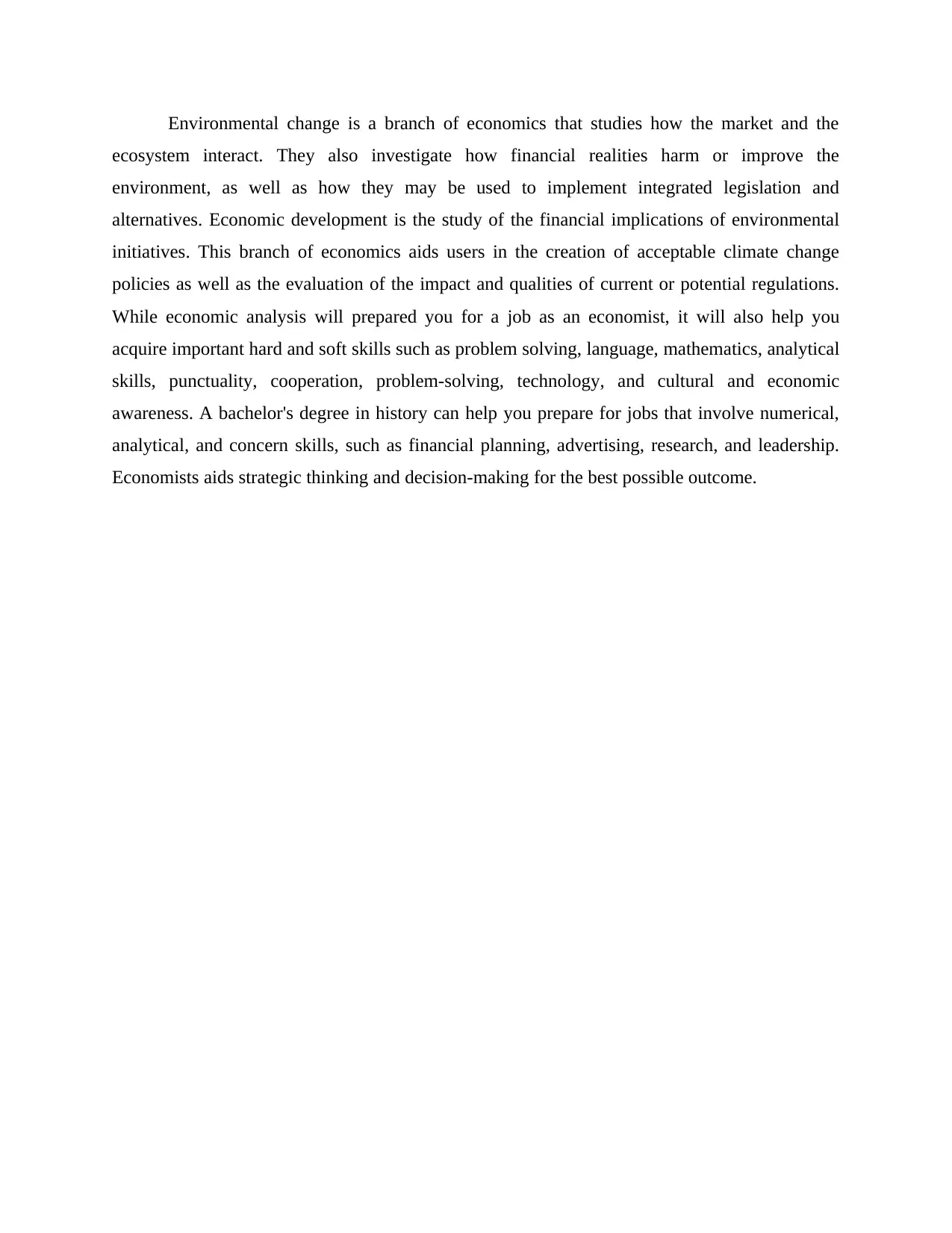
Environmental change is a branch of economics that studies how the market and the
ecosystem interact. They also investigate how financial realities harm or improve the
environment, as well as how they may be used to implement integrated legislation and
alternatives. Economic development is the study of the financial implications of environmental
initiatives. This branch of economics aids users in the creation of acceptable climate change
policies as well as the evaluation of the impact and qualities of current or potential regulations.
While economic analysis will prepared you for a job as an economist, it will also help you
acquire important hard and soft skills such as problem solving, language, mathematics, analytical
skills, punctuality, cooperation, problem-solving, technology, and cultural and economic
awareness. A bachelor's degree in history can help you prepare for jobs that involve numerical,
analytical, and concern skills, such as financial planning, advertising, research, and leadership.
Economists aids strategic thinking and decision-making for the best possible outcome.
ecosystem interact. They also investigate how financial realities harm or improve the
environment, as well as how they may be used to implement integrated legislation and
alternatives. Economic development is the study of the financial implications of environmental
initiatives. This branch of economics aids users in the creation of acceptable climate change
policies as well as the evaluation of the impact and qualities of current or potential regulations.
While economic analysis will prepared you for a job as an economist, it will also help you
acquire important hard and soft skills such as problem solving, language, mathematics, analytical
skills, punctuality, cooperation, problem-solving, technology, and cultural and economic
awareness. A bachelor's degree in history can help you prepare for jobs that involve numerical,
analytical, and concern skills, such as financial planning, advertising, research, and leadership.
Economists aids strategic thinking and decision-making for the best possible outcome.
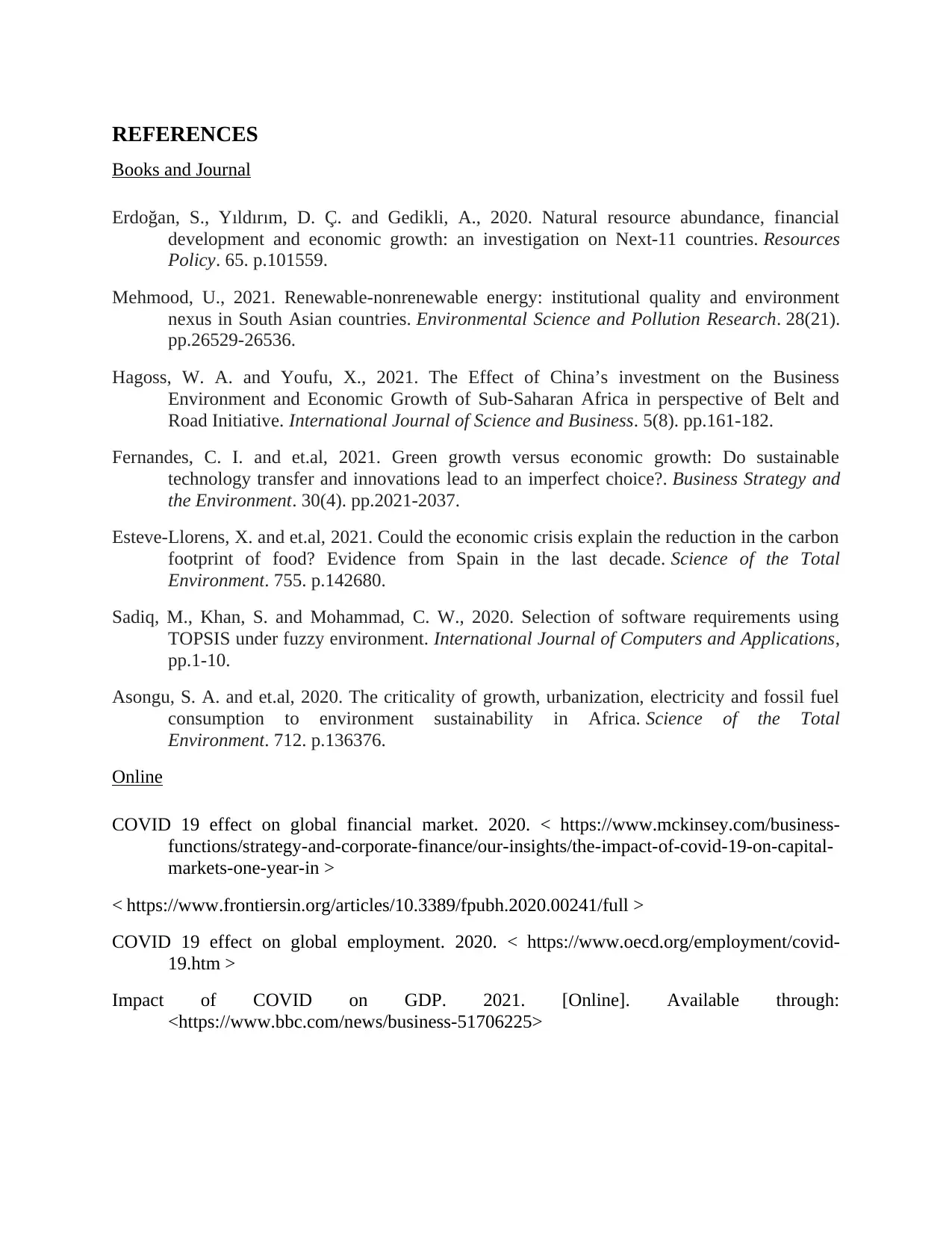
REFERENCES
Books and Journal
Erdoğan, S., Yıldırım, D. Ç. and Gedikli, A., 2020. Natural resource abundance, financial
development and economic growth: an investigation on Next-11 countries. Resources
Policy. 65. p.101559.
Mehmood, U., 2021. Renewable-nonrenewable energy: institutional quality and environment
nexus in South Asian countries. Environmental Science and Pollution Research. 28(21).
pp.26529-26536.
Hagoss, W. A. and Youfu, X., 2021. The Effect of China’s investment on the Business
Environment and Economic Growth of Sub-Saharan Africa in perspective of Belt and
Road Initiative. International Journal of Science and Business. 5(8). pp.161-182.
Fernandes, C. I. and et.al, 2021. Green growth versus economic growth: Do sustainable
technology transfer and innovations lead to an imperfect choice?. Business Strategy and
the Environment. 30(4). pp.2021-2037.
Esteve-Llorens, X. and et.al, 2021. Could the economic crisis explain the reduction in the carbon
footprint of food? Evidence from Spain in the last decade. Science of the Total
Environment. 755. p.142680.
Sadiq, M., Khan, S. and Mohammad, C. W., 2020. Selection of software requirements using
TOPSIS under fuzzy environment. International Journal of Computers and Applications,
pp.1-10.
Asongu, S. A. and et.al, 2020. The criticality of growth, urbanization, electricity and fossil fuel
consumption to environment sustainability in Africa. Science of the Total
Environment. 712. p.136376.
Online
COVID 19 effect on global financial market. 2020. < https://www.mckinsey.com/business-
functions/strategy-and-corporate-finance/our-insights/the-impact-of-covid-19-on-capital-
markets-one-year-in >
< https://www.frontiersin.org/articles/10.3389/fpubh.2020.00241/full >
COVID 19 effect on global employment. 2020. < https://www.oecd.org/employment/covid-
19.htm >
Impact of COVID on GDP. 2021. [Online]. Available through:
<https://www.bbc.com/news/business-51706225>
Books and Journal
Erdoğan, S., Yıldırım, D. Ç. and Gedikli, A., 2020. Natural resource abundance, financial
development and economic growth: an investigation on Next-11 countries. Resources
Policy. 65. p.101559.
Mehmood, U., 2021. Renewable-nonrenewable energy: institutional quality and environment
nexus in South Asian countries. Environmental Science and Pollution Research. 28(21).
pp.26529-26536.
Hagoss, W. A. and Youfu, X., 2021. The Effect of China’s investment on the Business
Environment and Economic Growth of Sub-Saharan Africa in perspective of Belt and
Road Initiative. International Journal of Science and Business. 5(8). pp.161-182.
Fernandes, C. I. and et.al, 2021. Green growth versus economic growth: Do sustainable
technology transfer and innovations lead to an imperfect choice?. Business Strategy and
the Environment. 30(4). pp.2021-2037.
Esteve-Llorens, X. and et.al, 2021. Could the economic crisis explain the reduction in the carbon
footprint of food? Evidence from Spain in the last decade. Science of the Total
Environment. 755. p.142680.
Sadiq, M., Khan, S. and Mohammad, C. W., 2020. Selection of software requirements using
TOPSIS under fuzzy environment. International Journal of Computers and Applications,
pp.1-10.
Asongu, S. A. and et.al, 2020. The criticality of growth, urbanization, electricity and fossil fuel
consumption to environment sustainability in Africa. Science of the Total
Environment. 712. p.136376.
Online
COVID 19 effect on global financial market. 2020. < https://www.mckinsey.com/business-
functions/strategy-and-corporate-finance/our-insights/the-impact-of-covid-19-on-capital-
markets-one-year-in >
< https://www.frontiersin.org/articles/10.3389/fpubh.2020.00241/full >
COVID 19 effect on global employment. 2020. < https://www.oecd.org/employment/covid-
19.htm >
Impact of COVID on GDP. 2021. [Online]. Available through:
<https://www.bbc.com/news/business-51706225>
⊘ This is a preview!⊘
Do you want full access?
Subscribe today to unlock all pages.

Trusted by 1+ million students worldwide
1 out of 9
Related Documents
Your All-in-One AI-Powered Toolkit for Academic Success.
+13062052269
info@desklib.com
Available 24*7 on WhatsApp / Email
![[object Object]](/_next/static/media/star-bottom.7253800d.svg)
Unlock your academic potential
Copyright © 2020–2025 A2Z Services. All Rights Reserved. Developed and managed by ZUCOL.




